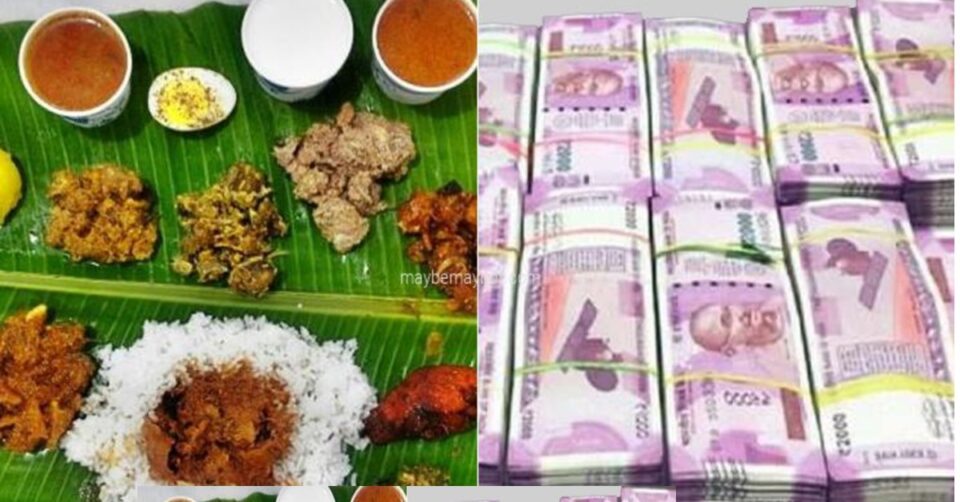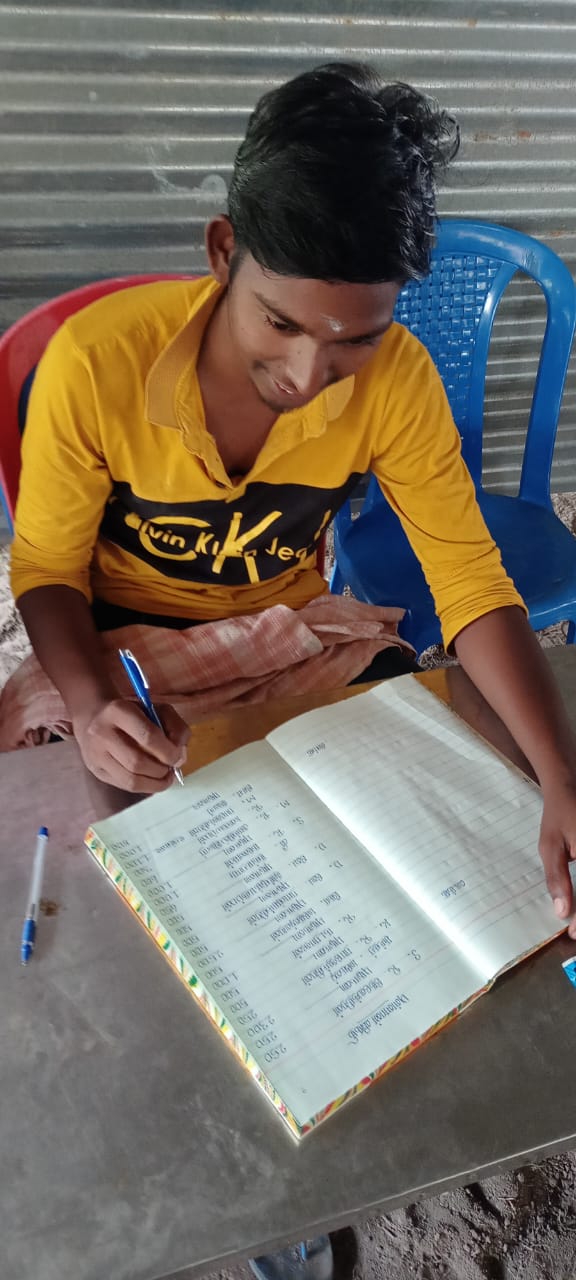மொய் விருந்து விழா
மொய் விருந்து விழாவின் மகத்துவம்
ஒரு கிராமத்தில் விழாக்கள் நடந்தால், மகிழ்ச்சி மட்டும் கூடும்; கடன் அல்ல — இதற்குப் பின்னால் தலைமுறைகளாக சொல்லப்படாமல், நடைமுறையில் வாழும் ஒரு மரபுக் கதை இருக்கிறது. தென்னிந்தியாவின் சில அமைதியான கிராமங்களில், மக்கள் ஒருவருக்கொருவர் பண உதவி செய்யும் தனித்துவமான முறையைக் கொண்டுள்ளனர். அந்த மரபின் பெயர் ‘மொய் விருந்து விழா’. இதை ஒரு சமூக சக்தியால் இயங்கும் அமைப்பாக நினைத்துக்கொள்ளலாம்; ஒரு விருந்தின் போது அனைவரும் தங்களால் இயன்ற அளவு பங்களிக்கிறார்கள், அது ஒவ்வொருவருக்கும் அவரவர் முறை வரும் போது உதவியாக இருக்கும். இது புத்திசாலித்தனமானதும் காலம் சோதித்ததுமான ஒரு முறையாகும், இந்த கிராம மக்கள் பொருளாதார ரீதியாக ஒருவரை ஒருவர் எப்படி கவனித்துக் கொள்கிறார்கள் என்பதைக் காட்டுகிறது. இந்த தனித்துவமான மரபு எவ்வாறு செயல்படுகிறது என்பதை ஆராய்வோம்!
பழைய காலம் vs புதிய காலம்
1980-களில், ஒரு கிராமத்தில் யாருக்காவது பெரிய அளவில் பணத் தேவை ஏற்பட்டால் —
உதாரணமாக திருமணத்திற்காக அல்லது கடன் பிரச்சனைக்காக — அவர்கள் ஊரிலுள்ள அனைவரையும் ஒரு விருந்திற்கு அழைப்பார்கள்.
விருந்திற்கு வந்தவர்கள், உணவு முடிந்த பிறகு பரிசாக சிறிதளவு பணத்தை வழங்குவார்கள்.
அந்த பணம் முழுவதும் விருந்து வைத்தவருக்கே; அதை மீண்டும் திருப்பி கொடுக்க வேண்டிய அவசியம் இல்லை.
ஆச்சரியமாக, 1980-களில் ‘மொய் விருந்து விழா’ எவ்வாறு நடைமுறையில் இருந்தது என்பதை
‘சின்ன கவுண்டர்’ என்ற பழைய தமிழ் திரைப்படத்திலும் காணலாம்.
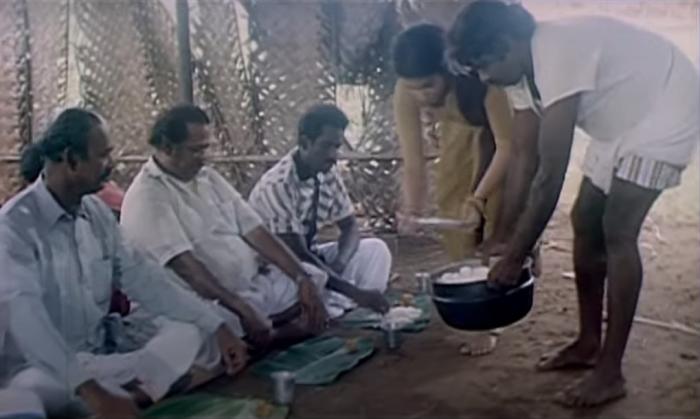
இன்றைய காலத்தில், இந்த நடைமுறை கொஞ்சம் மாறியுள்ளது. இதை சுமார் ஐந்து ஆண்டுகள் நீடிக்கும் ஒரு குழு சேமிப்பு திட்டமாகக் கருதலாம். யாராவது ‘மொய் விருந்து விழா’ நடத்தும்போது, அவரை அறிந்தவர்கள் சிறிய தொகையை வழங்குகிறார்கள். யார் எவ்வளவு கொடுத்தார்கள் என்பதை விருந்து வைத்தவர் குறிப்பெடுத்து வைத்துக்கொள்கிறார். சுமார் ஐந்து ஆண்டுகளுக்குப் பிறகு, அவரே விருந்து நடத்தும் முறை வருகிறது. முன்பு அவர் உதவியவர்கள், மேலும் சில புதியவர்களும், அந்த விருந்தில் கலந்து கொண்டு பணம் வழங்குகிறார்கள். அந்த நேரத்தில் கிடைக்கும் பணம் அவருக்கு உதவியாக இருக்கும்; பின்னர் அவர் மற்றவர்கள் ‘மொய் விருந்து விழா’ நடத்தும் போது மீண்டும் பங்களிப்பார். இவ்வாறு, நீண்ட காலம் தொடரும் பரஸ்பர உதவியின் ஒரு சுழற்சியாக இது உருவாகியுள்ளது.
அழைப்பிதழ்களும் பங்களிப்புகளும்
யாராவது ‘மொய் விருந்து விழா’ நடத்தும் போது, அவர்கள் அறிந்த அனைவரையும் அழைப்பார்கள்.
இதில் குடும்பத்தினர், நண்பர்கள், முன்பு தாங்கள் பணம் வழங்கியவர்கள்,
மேலும் கிராமத்தைச் சுற்றியுள்ள சில புதியவர்களும் அடங்குவர்.
பொதுவாக, அழகான அழைப்பிதழ்களை அச்சிட்டு வழங்குவார்கள்.
அந்த அழைப்பிதழ்களில் விருந்து வைத்தவரின் பெயர், அவர்கள் வசிக்கும் இடம்,
விருந்து நடைபெறும் தேதி, நேரம் மற்றும் இடம் போன்ற முழு விவரங்களும் இடம்பெறும்.
அழைப்பிதழில் உள்ள பெயர் மிகவும் முக்கியமானது;
ஏனெனில், முன்பு யார் யார் தங்கள் நிகழ்வுகளுக்கு பங்களித்தார்கள் என்பதை
நினைவில் வைத்துக்கொள்ள இது விருந்து வைத்தவருக்கு உதவுகிறது.
சில நேரங்களில், இரண்டு அல்லது அதற்கு மேற்பட்டவர்கள் ஒரே நாளில்
தங்களது ‘மொய் விருந்து விழா’ நடத்துவார்கள்.
அப்படியானால், அனைவரின் பெயர்களும் ஒரே அழைப்பிதழில் இடம்பெறும்.
நிகழ்வு குறித்து அனைவருக்கும் தெரியும்படி செய்ய,
அருகிலுள்ள கிராமங்களில் பெரிய அறிவிப்பு பலகைகள் அல்லது பேனர்களையும் வைப்பார்கள்.
இது தனிப்பட்ட அழைப்பிதழ் கிடைக்காதவர்களுக்கு ஒரு நினைவூட்டலாக இருக்கும்.
பலர் இணைந்து விருந்து நடத்தும் போது,
நிகழ்ச்சிக்காக செலவாகும் தொகையையும் அவர்கள் ஒருவருக்கொருவர் பகிர்ந்து கொள்வார்கள்.
மேலும், சில சமயங்களில் ஒரே ஒருவர் தனியாகவே
மிகப் பெரிய அளவில் ‘மொய் விருந்து விழா’ நடத்துவதும் உண்டு.
அவர்கள் இந்த நிகழ்விற்கு அதிகமாக செலவு செய்யலாம்;
ஏனெனில், அனைவரிடமிருந்தும் கிடைக்கும் மொத்த பங்களிப்பு
பெரிய தொகையாக இருக்கும் என்ற நம்பிக்கையுடன் அதை நடத்துகிறார்கள்.
பெயர் பதிவு முதல் பண சேகரிப்பு வரை
‘மொய் விருந்து விழா’ நடைபெறும் இடத்திற்கு மக்கள் வந்தவுடன்,
பணம் பரிமாற்றத்தில் பங்கேற்கும் அல்லது விருந்து நடத்தும் ஒவ்வொருவருக்காகவும்
தனித்தனியாக அமைக்கப்பட்ட இடங்களை அவர்கள் காண்பார்கள்.
ஒவ்வொரு இடத்திலும் ஒரு குறிப்புப் புத்தகம் மற்றும் அதில் எழுதுவதற்கான ஒருவர் இருப்பார்.
மேலும், பணத்தைப் பெறுவதற்குப் பொறுப்பான ஒருவரும்,
நிகழ்ச்சி முழுவதும் பணத்தை பாதுகாப்பாக வைத்திருக்க
ஒரு பெரிய பாத்திரம் (அண்டா சட்டி) கூட இருக்கும்.
அழைக்கப்பட்ட விருந்தினர் வந்தவுடன்,
தாம் பணம் வழங்க விரும்பும் நபருக்கான இடத்தைத் தேடிச் செல்வார்.
அந்த இடத்தை எளிதில் கண்டுபிடிக்க,
சிறிய பெயர்பலகை அல்லது அறிவிப்பு அங்கு வைக்கப்பட்டிருக்கும்.
சரியான இடத்தை அடைந்தவுடன், அவர் தன் பெயரை கூறுவார்.
குறிப்புப் புத்தகத்தை வைத்திருப்பவர்,
விருந்தினரின் பெயரையும் அவர் வழங்கும் பணத் தொகையையும் பதிவு செய்வார்.
அதனைத் தொடர்ந்து, பணத்தை வசூலிக்கும் பொறுப்பிலுள்ளவர்
அந்த தொகையை பெற்றுக் கொண்டு, பாதுகாப்பாக அண்டா சட்டியில் வைப்பார்.
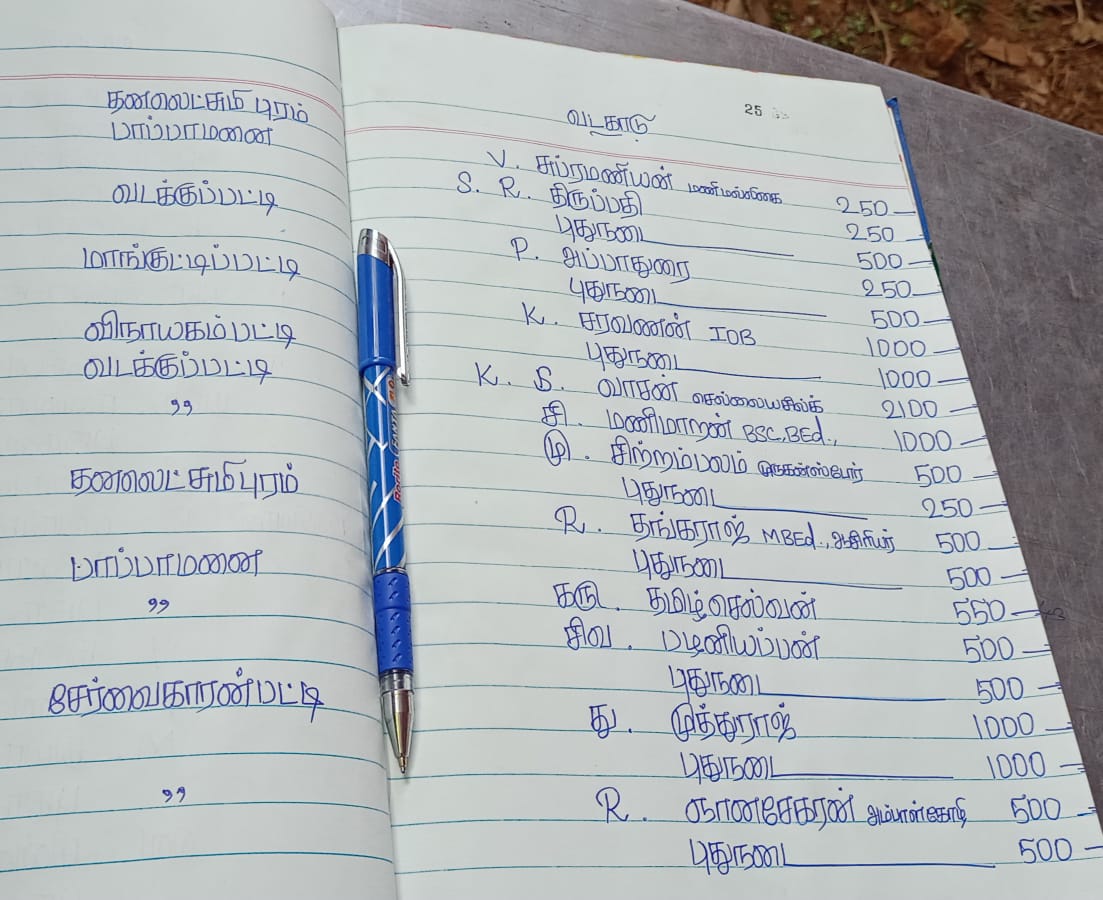
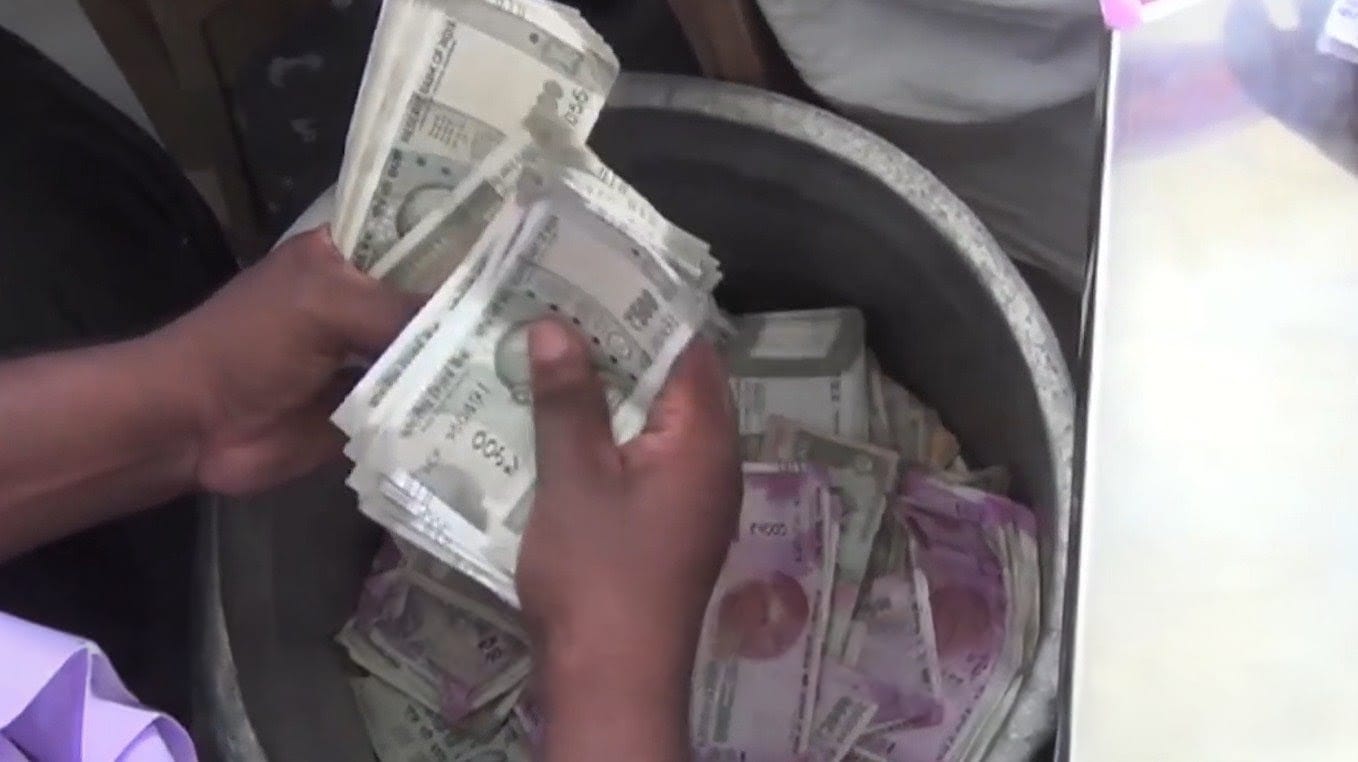
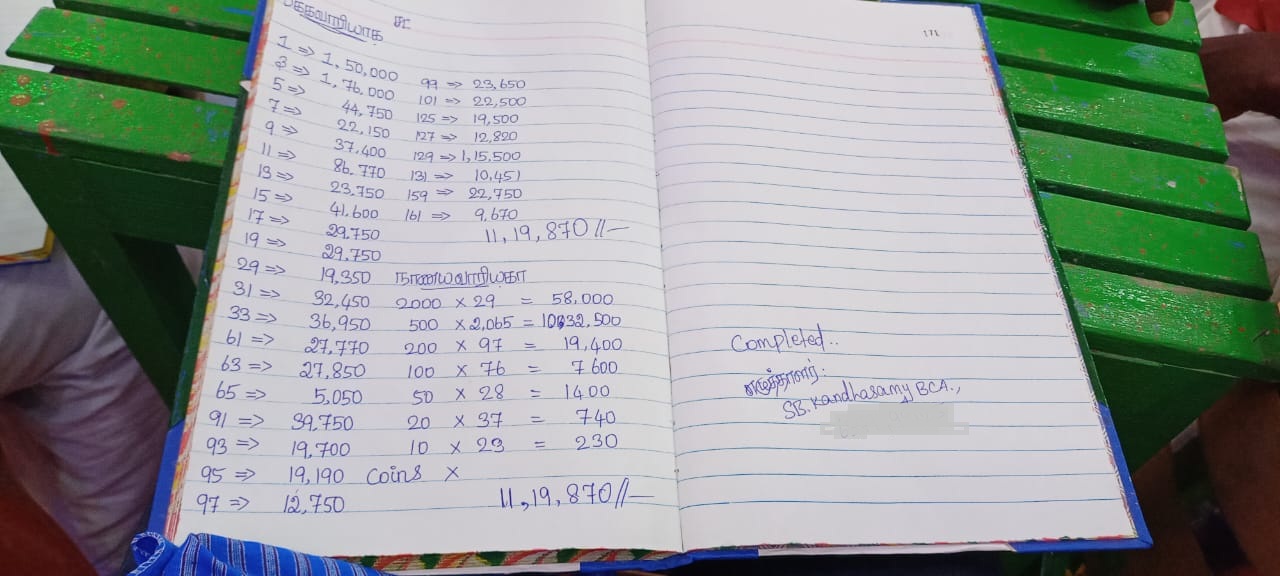
மரபும் சுவையும் ஒன்றாகும் தருணம்
‘மொய் விருந்து விழா’யின் உணவுகளைப் பற்றி பேசினால்,
அதில் அனைவருக்கும் ஏற்ற வகையான உணவுகள் இடம் பெறும்.
அசைவமும் சைவமும் இரண்டும் வழங்கப்படுவது இதன் சிறப்பு.
அசைவ உணவுகளை விரும்புவோருக்கு, சாதம், மணமிக்க மட்டன் குழம்பு,
காரசாரமான மட்டன் ரசம், மேலும் இரத்தத்துடன் சேர்த்து சமைக்கப்படும்
‘போட்டி’ எனப்படும் தனித்துவமான துணை உணவும் வழங்கப்படும்.
சிலர் தங்கள் விருந்தில் மீன், கோழி, முட்டை போன்றவற்றையும் சேர்ப்பார்கள்.
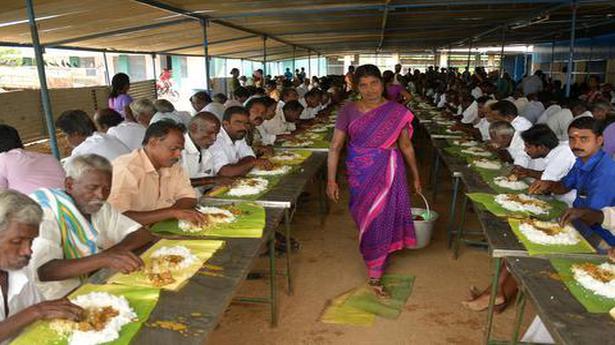
சைவ உணவுகளை விரும்புவோருக்காக, சாதம், சாம்பார், ரசம், குளிர்ச்சியான மோர், மேலும் பல சுவையான துணை உணவுகளும் பரிமாறப்படும்.
நிகழ்ச்சி தொடங்கியவுடன் விருந்தும் ஆரம்பமாகி, மக்கள் தங்களது ‘மொய்’ வழங்கும் நேரத்தோடு சேர்ந்து நடைபெறும். உணவு தயாரிப்பதற்கும் பரிமாறுவதற்கும் தனியாக நியமிக்கப்பட்டவர்கள் இருப்பார்கள்; அவர்கள் அனைவருக்கும் உணவு கிடைப்பதை உறுதி செய்வார்கள்.
இங்கு மிகவும் சிறப்பான விஷயம் என்னவென்றால், இந்த விருந்தில் யாரும் வரலாம் — குடும்பத்தினர், நண்பர்கள், மொய் வழங்குபவர்கள், அல்லது தற்செயலாக அங்கு வந்தவர்கள்கூட. மிகவும் திறந்த மனப்பான்மையுடனும் அன்பான வரவேற்புடனும் கூடிய சூழல் நிலவுவதால், அறிமுகம் இல்லாத ஒருவர் வந்து உணவு உண்டாலும் யாரும் கேள்வி கேட்பதில்லை.
முதலீடு முதல் பொறுப்பான செலவினம் வரை
அப்படியானால், கிடைக்கும் இந்தப் பணத்தை மக்கள் என்ன செய்வார்கள்? அது முழுவதும் அவர்களுக்கு கிடைக்கும் தொகையின் அளவினைப் பொறுத்தது. பெரிய தொகை கிடைப்பவர்கள், விவசாயத்திற்காக நிலம் வாங்குதல், சிறிய தொழில் தொடங்குதல், அல்லது வேறு வகை முதலீடுகளில் அதை பயன்படுத்துவார்கள். சிறிய அல்லது சராசரி அளவிலான தொகை கிடைப்பவர்கள், தங்களிடம் உள்ள கடன்களை அடைப்பதற்காக அந்தப் பணத்தைச் செலவிடுவார்கள்.
மேலும், தற்போதைய ஐந்து ஆண்டு சுழற்சியில் மற்றவர்கள் நடத்தும் ‘மொய் விருந்து விழா’களில் பங்களிப்பதற்காக அந்தத் தொகையிலிருந்து சில பணத்தை சேமித்துவைப்பதும் வழக்கமாகும். இந்தப் பணத்தை புத்திசாலித்தனமாகவும் பொறுப்புடன் பயன்படுத்தினால், இந்த மரபின் மூலம் உண்மையிலேயே பலன் அடைய முடியும் என்று சொல்லப்படுகிறது. ஆனால், பண மேலாண்மை சரியாக இல்லாவிட்டால், தங்கள் முறை வரும் போது மீண்டும் பங்களிக்க முடியாமல் போகலாம்; அது சமூகத்தில் சிக்கல்களை உருவாக்கும் நிலைக்கும் காரணமாக அமையக்கூடும்.
சமூக ஆதரவும் பரஸ்பர உதவியும் உருவாக்கும் நிதி மரபு
‘மொய் விருந்து விழா’ என்பது வெறும் ஒரு பண்பாட்டு நிகழ்வு மட்டும் அல்ல;
அது நெருக்கமான சமூகத்தில் பொருளாதாரத்தை நிர்வகிக்கும்
நடைமுறைசார்ந்ததும் மனதோடு இணைந்ததுமான ஒரு அணுகுமுறையாகும்.
மக்களை ஒன்றிணைக்கும் கூட்டு விருந்திலிருந்து ஒழுங்கமைக்கப்பட்ட ‘மொய்’ பரிமாற்றம் வரை,
இந்த மரபு விருந்தும் பொருளாதாரமும் எவ்வாறு ஒன்றிணைகின்றன என்பதைக்
அழகாக எடுத்துக்காட்டுகிறது. சில நேரங்களில்,
நவீன நிதி அமைப்புகளின் தனிமையும் இயந்திரத் தன்மையையும் விட,
சமூக ஆதரவும் பரஸ்பர உதவியும் அடிப்படையாகக் கொண்ட
எளிமையான, ஆனால் ஆழமான கொள்கைகளில்தான் மிகச் சிறந்த பொருளாதார தீர்வுகள்
வேர் கொண்டிருக்கின்றன என்பதை இந்த மரபு நமக்கு மதிப்புமிக்க ஒரு நினைவூட்டலாக வழங்குகிறது.
